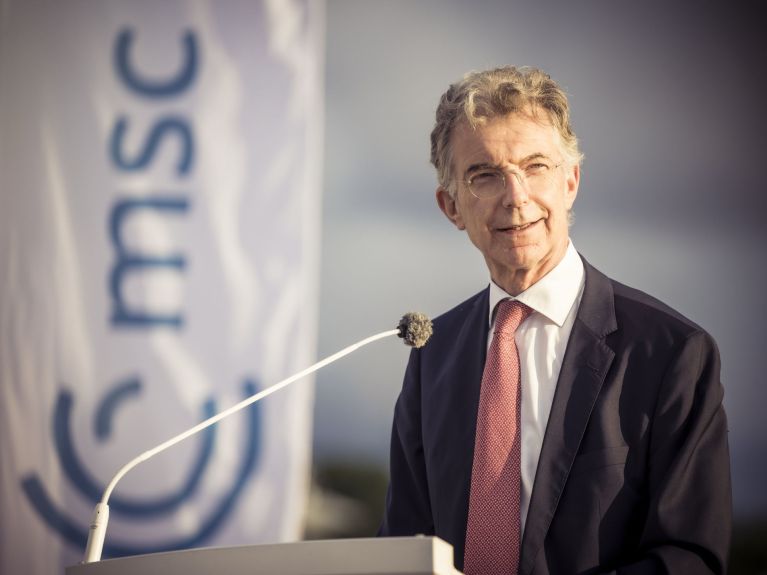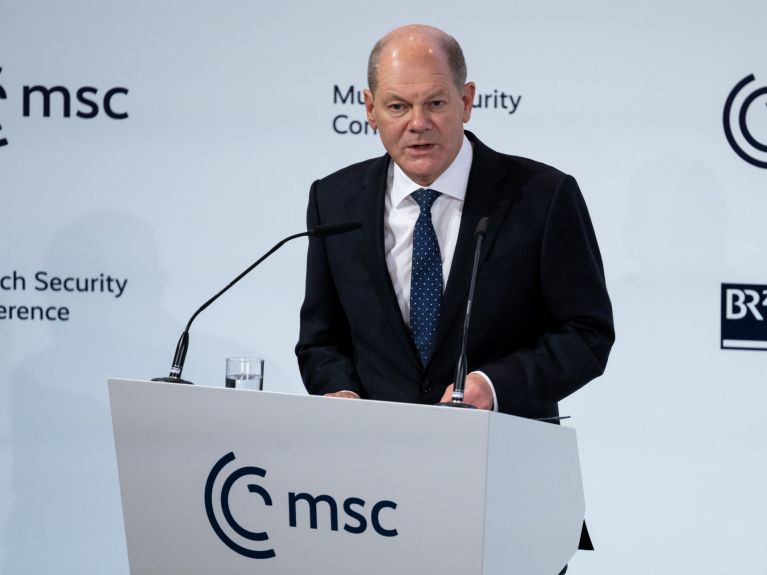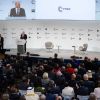MSC chairman Heusgen: “Promoting peace through dialogue”
The chairman of the Munich Security Conference, Christoph Heusgen, talks about the aims of the conference and the future of the international order.

Mr Heusgen, the Security Conference celebrates its 60th anniversary in 2024. How can the conference continue to fulfil its core mission of providing a platform for sustainable debate?
As I see it, it’s crucial to strike the right balance between change and continuity. Despite all the changes that have happened over the last six decades, our core mission remains the same: we provide an independent platform for constructive discourse on the most pressing international security challenges with the aim of promoting peace through dialogue. In view of the increasingly aggressive revisionism we’re seeing, as well as the numerous crises and conflicts around the world involving bloodshed, this core mission is more important today than ever.
At the same time, a platform like ours can only remain relevant if it moves with the times. Over the past 60 years, the conference has consistently adapted to the changing geostrategic environment. At the beginning, in the middle of the Cold War, it was mainly male and transatlantic representatives who met behind closed doors to engage in debate on tough security issues. Over time, the group of participants has broadened and become much more diverse, as has the range of topics.
I’ve taken action to ensure we achieve gender parity on our panels.
From the very outset, it was important to me to increase the share of participants from the Global South so as to expand the dialogue beyond the transatlantic core. I’ve also taken action to ensure we achieve gender parity on our panels, which we managed to do last year. Although the Russian war of aggression against Ukraine has put traditional security issues back at the top of our agenda, we continue to address broader security topics such as climate security and the impact of new technologies like generative AI.

The war in Ukraine and the Middle East conflict will probably dominate this year’s conference. What messages do you hope the security conference will send out?
These two topics will have a key role to play in Munich of course. At last year’s conference we saw a great deal of transatlantic unity and determination in terms of supporting Ukraine. We’ve also seen a lot of bold steps being taken since then – not least by the German government, which is now the second largest military supporter of Ukraine. Nonetheless, the past weeks and months have raised doubts as to whether this transatlantic support is sufficient and whether it will really be permanent. I’d like to see the Munich conference send out a clear signal in this regard, especially on the part of the Europeans.
The conflict in the Middle East is certain to be a dominating theme of the debates in Munich, too. Our aim here is to get transatlantic partners to engage with key representatives of the region so as to discuss potential paths for de-escalation. This also includes the question of how we can defuse the catastrophic humanitarian situation in Gaza, how things might go on after a possible ceasefire and what a sustainable peace process might look like.
Unfortunately, Ukraine and the Middle East are not the only conflicts that we have to keep on the agenda and where we hope to find solutions. There are a number of conflicts around the world that receive less media attention and don’t attract as much interest politically but are no less serious for that. Here I’m thinking of the bloody civil war in Sudan, for example, which has already forced some nine million people to flee their homes. Then there’s the humanitarian crisis in Haiti, where criminal gangs are laying siege to a large part of the country.
How do you think it will be possible to strengthen the rules-based international order once again?
We need to develop a positive and inclusive vision for the future of this order. Firstly, this means defending its foundations – the UN Charter and the Universal Declaration of Human Rights. If we start to call these into question, we move into a world governed not by the rule of law but by the law of the jungle. At the same time, we also need to think about reforms under a broad coalition.
We need to develop a positive and inclusive vision for the future of the international order.
In addition to transatlantic partners, such a coalition has to bring in representatives of the countries of the Global South and address their concerns, too. This includes the question of how we can make multilateral institutions more representative. It’s good to see that the African Union was included in the G20 group in 2023. But if you look at the UN Security Council and the international financial institutions, you see that African, South American and Asian voices continue to be underrepresented.
What role can Europe and Germany play here?
Germany and Europe have to play a leading role here. Germany is the world’s second largest donor of development aid and humanitarian aid and the second most important funder in the UN system. Taken together, the European Union is both the world’s largest donor and the largest single market. This economic weight involves considerable political responsibility.
As Europeans, we have to do more to extend a hand to the countries of the Global South.
The times are over when we could be an economic giant and a political dwarf, often in the slipstream of our American allies. Germany and Europe have to boost their efforts to defend the foundations of the rules-based international order. This also means backing Ukraine more emphatically and supplying it with the weapons and ammunition it needs to defend its territorial sovereignty.
As Europeans, we also have to do more to extend a hand to the countries of the Global South. This also includes working with them to ensure they’re better represented in multilateral institutions. I believe the longstanding demand for a permanent seat for Germany on the UN Security Council is outdated. In view of global demographic and economic developments, it’s difficult to justify the fact that Europe is represented with three permanent seats while Africa and Latin America have none at all. Instead, we as Europeans need to speak with one voice in the United Nations and other international organisations.


